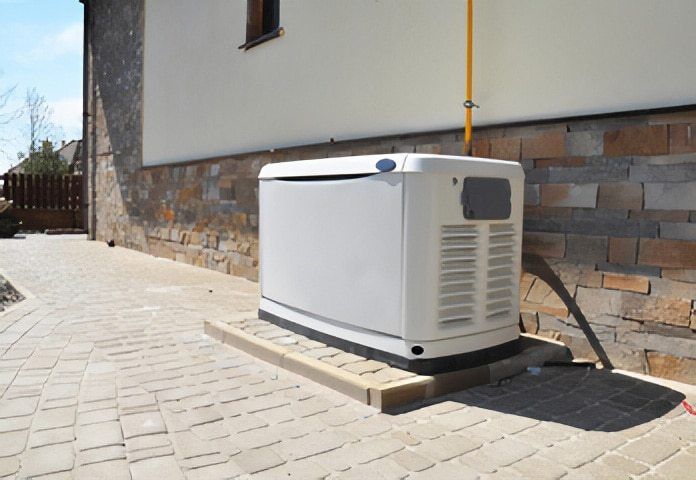You’ve just purchased a home, and you’re excited to start living there. You’ve unpacked your things, put up some pictures, and settled in. But now you have one more thing to do: figure out what size generator will work best for your house.
If you’re planning to power your home with a generator, then you’re probably wondering what size of generator do I need. This can be a tricky question because there are several factors that go into it.
In this article, we’ll walk you through some of the things you should consider when choosing a generator for your home and what size would work best for your needs.
What is Inverter Generator?
An Inverter Generator is a piece of equipment that converts the mechanical energy in a rotating shaft into electrical energy. It does this by using either an air conditioner or DC generator, which is similar to each other except that one uses AC power and the other uses DC power.
The way it works is pretty simple: when you turn on the machine, it starts to produce electricity. The process is pretty much the same as turning on any other electrical appliance. However, there are some differences between these two types of generators.
The first difference is how they make their own power source. When you turn on an AC generator, you need to connect it to your home’s main power supply so that it can start generating electricity. But if you want to use your generator outside your home (like during an emergency), then you will need an inverter generator instead because they don’t need any external power connections at all.
How Much Generator Power Do You Need In Home?
If you’re thinking about getting a generator, there are a few things to consider. First, you need to determine how much power your house requires.
The amount of power a device needs varies based on its size and how much you use it. If you use a lot of electronics, you’ll probably need more power than someone who only uses a few devices at once. Here’s a table with the typical wattages of common household appliances:
| Appliance | Typical Power Consumption (Watts) |
| Incandescent Light Bulb (60W) | 60W |
| Compact Fluorescent Lamp (CFL) | 9-52W |
| LED Light Bulb | 4-22W |
| Refrigerator (full-size) | 100-600W |
| Refrigerator (mini) | 50-200W |
| Freezer (chest or upright) | 100-400W |
| Air Conditioner (window unit) | 500-1,500W |
| Air Conditioner (central) | 2,000-5,000W |
| Microwave Oven | 600-1,200W |
| Toaster Oven | 1,200-1,800W |
| Electric Stove/Oven | 1,000-5,000W (per burner) |
| Dishwasher | 1,200-2,400W |
| Washing Machine | 300-500W |
| Clothes Dryer | 1,800-5,000W |
| Television (LCD/LED) | 30-150W |
| Television (Plasma) | 200-500W |
| Computer (Desktop) | 150-500W |
| Laptop | 30-90W |
| Router/Modem | 5-30W |
| Ceiling Fan | 10-100W |
| Electric Heater | 500-2,000W |
| Iron | 1,000-1,800W |
| Hair Dryer | 800-1,800W |
| Coffee Maker | 600-1,200W |
| Toaster | 800-1,200W |
| Blender | 300-1,200W |
Once you have the power requirements for all the devices, you can add them together to determine the overall power requirement for your generator selection. It’s advisable to consult with an electrician in Calgary for accurate calculations and to ensure the generator you choose can meet the combined power demands of your devices.
How to Calculate What Size Generator Do I Need to Power a House?
If you’ve ever wondered how big of a generator you need to power your house, knowing where to begin can be tough. After all, there are so many different factors that go into calculating the right size generator for your home.
So we’ve put together this handy guide to help you figure out what size generator do I need to power your house. Here are some quick steps to help you decide how much generator Power do you need in your home:
- Locate the label or user manual
This will tell you what kind of voltage and current your device uses. Read this carefully! You don’t want to overload your generator!
- Check for power ratings
Look up online what the maximum wattage or amperage ratings are for each device (or even just check their label). If any device is too high for your generator to handle, you’ll have to buy a bigger one—so make sure you know what kind of power draw your device has!
- Calculate power consumption
Another thing is you need to determine how much power each device in your home uses. You’ll want to know how many watts each device uses per hour (W/h) and how many hours you use it per day (h). For example, if you have a television that uses 400 W and you watch it 4 hours per day, then the total amount of power consumption will be 1600 W/h x 4 h = 6400 W/day or 384 kWh/month.
- Consider starting power
If you have an older home (or even if you don’t), it may be worth considering adding a standby generator in order to support critical devices during power outages. A good rule of thumb is that if something needs to run for more than 30 minutes, it should be powered by a generator rather than electricity from the grid.
- Add up the power requirements
Calculate the total power requirement by adding up the power consumption of all essential loads, including any additional starting power for applicable devices. This will give you the total power needed to run your essential appliances simultaneously.
It’s important to include things like TVs, washing machines, refrigerators, lights—even air conditioners. Make sure you’re not forgetting anything.
- Consider future needs
Consider whether any new appliances will be added and how much they will use. If there are no new appliances planned, then go to step #1 and repeat until there are no more changes needed.
- Choose a generator size
If you’re planning a generator for your house, choosing the right size is important. Wondering, “How big of a generator do I need for my house?” A larger generator will be able to handle the power needs of your home, but something smaller can be used in an emergency situation when the power goes out. The best way to make sure that you choose the right size is by calculating your wattage needs.
By repeating these steps for each device you want to power, you can determine the individual power requirements. Remember to consider both the running power and any starting power for devices with surge requirements.
Importance Of Choosing The Right Size Generator
It’s no secret that generators are important. They keep your home safe and running during power outages, help you save money on your monthly electric bill, and even keep the lights on when you’re using your favorite appliances.
But with all the benefits of owning a generator comes some responsibility—and when it comes to generators, there’s one thing you need to know: size matters. Here’s how choosing the right size generator is crucial for several reasons:
- Meeting power requirements
Your generator needs to be able to meet your power requirements. If you’re planning on running a lot of appliances and devices, then you’ll need a generator that will be able to keep up. Think about how much electricity you’ll need and ensure the generator you choose will be able to meet those needs.
- Avoiding overload and damage
A generator can only produce so much electricity at one time. If you try to run too many appliances or devices at once, then there won’t be enough electricity for all of them, which means they won’t work properly or at all! Make sure that your generator has enough power output capacity so that it doesn’t overload when running multiple items at once.
- Preserving appliance lifespan
When you buy a generator, you want it to last. But you also want it to be able to handle your needs. That’s why choosing the right size for your generator is important. If your generator is too small for your home, it might not be able to power everything you need—and if it’s too large, it could damage some of your appliances.
- Optimizing fuel efficiency
The larger the generator, the more fuel-efficient it is likely to be because it has less strain on its engine during operation. Smaller generators use more fuel per hour than larger ones because they have less power and therefore require more energy to run at full capacity.
- Cost-effectiveness
Not all generators are created equal; some will cost you more in gas, maintenance, and installation than others. The best thing you can do is invest in a larger generator that will run your entire business without having to worry about paying for extra fuel or hiring an electrician to come out and rewire your whole place.
- Ease of installation and maintenance
It’s not just about the cost of installation—it’s also about how much work it will be for you to keep up with maintaining your generator once it’s installed! You don’t want something so complicated or expensive that it becomes more trouble than it’s worth after just a few months of use! Choose wisely here—you’ll want something that can handle all of your needs without costing you an arm and a leg down the line when something goes wrong (which it inevitably will).
- Safety
Make sure to follow all manufacturer guidelines for installing and using your generator—they can help prevent fire hazards as well as other safety hazards like carbon monoxide poisoning.
- Noise level
If you plan on using your new generator at home during power outages, make sure to get one with a noise rating under 55 decibels—especially if you’ll be using it inside.
Get The Best Advice From Qualified Electricians In Calgary!
When it comes to choosing the right size generator, there are many factors to consider. In order to get the best advice, you should talk to professional electricians in Calgary.
ClearView Services is a full-service electrical contracting company specializing in designing, installing, and repairing electrical systems. With so many companies claiming to be experts in this field, it’s hard to know who to trust. That’s why we go above and beyond for our clients—we’re here to help you determine what size generator will work best for your residence or commercial building, both now and in the future.
We work closely with you to make sure that you have the right amount of power at all times, whether there’s an unexpected outage or if you need extra juice during peak usage hours. Our team of experts will take into account your energy needs, along with other factors like weather conditions and whether or not your house is hooked up directly to a utility grid or operates on its own power source (like solar panels).
We are committed to offering our customers top-quality service at a reasonable price.
Our Electricians in Calgary have over 30 years of experience in the industry and are familiar with everything from small generators for residential use up to commercial-sized units that could power an entire neighborhood during an emergency situation.
If you have any questions about how much power your home needs or need any Electrical Solutions in Calgary, don’t hesitate! Just give us a call today at 587-912-1920!






